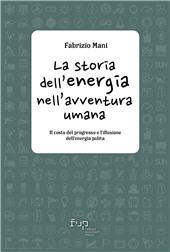2024 - Firenze University Press
eBook
Digital Version
Herunterladen | Kopieren/Einfügen | Drucken
La storia dell'energia nell'avventura umana : il costo del progresso e l'illusione dell'energia pulita
1-225 p.
- Energy is the engine of human progress and human history is marked by the quantity and characteristics of available resources. In the last century, with the world population quadrupling and the use of new technologies, energy consumption has accelerated dramatically. The combustion of fossil fuels has increased the concentration of "greenhouse gases" and caused global temperatures to rise, resulting in climate change. Europe, a leader in the fight against climate change, has a modest influence globally, and it is illusory to think that there are now effective solutions that can be shared by all countries for resolving environmental problems quickly. Certainly, electric cars are not the answer. We will therefore have to adapt to the effects of climate change for many decades to come, even if scientific progress discovers energy systems which are unlimited and "cleaner" than today.
- Fabrizio Mani was full professor of Chemistry at the University of Florence. After retiring, he took up the position of research associate at the ICCOM Institute of the CNR, National Research Council. He is the author of more than 150 publications in international scientific journals and co-author of several university chemistry textbooks. In more recent years, his scientific research has been directed towards the study of innovative methods for capturing CO2, (the main greenhouse gas) and its conversion into commercially useful products. For these studies, he was awarded the prestigious "Amerigo Vespucci" Tuscan Innovation Prize. [Publisher's text]
- L'energia è il motore del progresso umano e la storia dell'umanità è scandita dalla quantità e dalle caratteristiche delle risorse disponibili. Nell'ultimo secolo, con la popolazione mondiale quadruplicata e con l'utilizzo delle nuove tecnologie, i consumi energetici hanno subìto una vertiginosa accelerazione: la combustione dei combustibili fossili ha aumentato la concentrazione dei 'gas serra' e la temperatura globale, con i conseguenti cambiamenti climatici. L'Europa, leader nella lotta ai cambiamenti climatici, ha una modesta influenza a livello globale, ed è illusorio pensare che esistano oggi soluzioni efficaci e condivisibili da tutti i Paesi, capaci di risolvere in tempi brevi i problemi ambientali. Certamente non lo sono le auto elettriche. Dunque dovremo adattarci agli effetti dei cambiamenti climatici ancora per molti decenni, anche se il progresso scientifico dovesse scoprire sistemi energetici illimitati e più 'puliti' di quelli odierni.
- Fabrizio Mani è stato professore ordinario di Chimica presso l'Università di Firenze. Dopo il suo pensionamento, ha assunto la posizione di ricercatore associato presso l'Istituto ICCOM del Consiglio Nazionale delle Ricerche. È autore di oltre 150 pubblicazioni su riviste scientifiche internazionali e coautore di diversi manuali universitari di chimica. Negli anni più recenti la sua ricerca scientifica è stata indirizzata allo studio di metodi innovativi di cattura di CO2, (il principale gas serra) e della sua conversione in prodotti di utilità commerciale. Per questi studi ha ottenuto il prestigioso Premio Innovazione Toscana "Amerigo Vespucci". [Testo dell'editore]
-
Informationen
ISBN: 9791221501315
REIHE
THEMENBEREICHE


